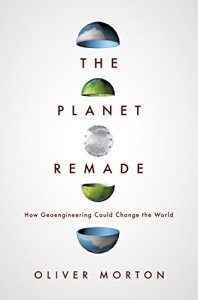Currently reading
Eleven
A Month in the Country
A Tale of the Dispossessed: A Novel
Mesabi Pioneers
The Crusades Through Arab Eyes
Island of a Thousand Mirrors
The Planet Remade: How Geoengineering Could Change the World
 Morton begins his synopsis of the possibilities of geoengineering by establishing the necessity of it. He begins with two questions: do you think climate change is bad enough to do something about it? do you think reducing emissions enough is very hard to do, maybe impossible? He answers yes to both questions, and says that most of today's politicans and environmentalists today answer no to one of these questions and yes to the other, depending on their political leanings. But, he says, if we need to do something about climate change and emissions reductions are not enough, we have to look at geoengineering.
Morton begins his synopsis of the possibilities of geoengineering by establishing the necessity of it. He begins with two questions: do you think climate change is bad enough to do something about it? do you think reducing emissions enough is very hard to do, maybe impossible? He answers yes to both questions, and says that most of today's politicans and environmentalists today answer no to one of these questions and yes to the other, depending on their political leanings. But, he says, if we need to do something about climate change and emissions reductions are not enough, we have to look at geoengineering.The primary action he examines is injecting aerosols into the stratosphere. That would, in effect, shade us a bit, so that we can have high carbon dioxide levels but not so much heating. He's definitely a cheerleader for this, but he's aware of the objections that have been or will be raised as this possibility works its way into the mainstream discussion about climate change.
He includes a wide-ranging historical analysis of how humans have changed the climate, both intentionally (or considered doing it intentionally) and unintentionally. This discussion was wide and detailed enough that he lost my interest a couple times, but I'll credit him with being thorough. And he does make his point. We are now and have been for at least a few decades, if not centuries, influential enough to change climate on a geologically noticeable scale.
He doesn't side-step the fear that intentionally changing the climate excites in most people. He addresses objections one by one in a more or less fair manner. He makes other forms of geoengineering, such as pulling CO2 out of the air and storing it, or seeding the ocean with nutrients to sequester CO2 that way, seem interesting but insufficient. In the latter case, it may even hurt the cause. And one of the biggest objections is that people may think that spreading sulfates as a shield would mean that we don't then need to reduce emissions... that's absolutely false, we still would, and he clearly states that over and over. So on the whole I thought he presented a responsible picture of the possibilities and risks of trying to construct our own climate.
In the end, I'm not as enthusiastic about geoengineering as Morton is, but I'm thankful for the well-researched, well-written book, and I walk away more informed and open-minded than when I started. That's a good outcome for any book on the topic, I would think.
I got a free copy of this from Net Galley.









